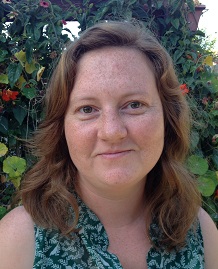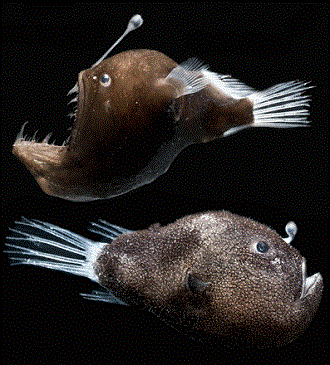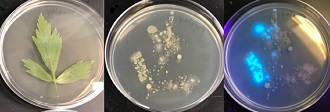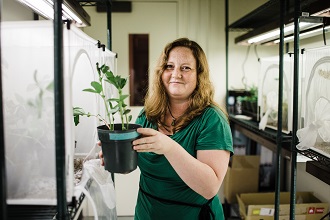About the department:
For me, the most unique thing about Cornell is that there is a lot of interaction across biology-related departments. There are evolutionary biologists like myself scattered around various departments in addition to Ecology and Evolutionary Biology. The community here has been very interactive and it’s been great to see excitement for interdisciplinary evolutionary biology, especially in host-microbe interactions.
About the research:
My research program is focused on understanding how interactions with eukaryotic hosts influence bacterial evolution. I’m interested in major evolutionary changes at the genome level, like genomic reduction and the evolution of novel traits. My dissertation work was on genome evolution of luminous symbionts in fish and we’re currently working on deep-sea anglerfish symbionts. But most of the work in the lab is on bacterial evolution in insect or plant associations using a combination of experiments and -omics. I’m happy to now have a great lab group working on diverse systems, but that we stay connected with common research themes.
What has been the biggest challenge as a new PI so far?
The thing I probably need to work on the most is being better at switching back and forth between different kinds of tasks in short periods of time. I rarely have large chunks of time to devote to writing but I find it hard to mentally switch modes sometimes. One thing that has helped has been making priority lists to be sure I focus on what needs to be done.
What has been the biggest surprise so far about being a new PI?
How much I like it! It seems funny to say, since it was the career I was aiming for, but what we do during much of our training (during grad school or postdocs) is so different than being a PI. It's hard to know how you will really like it until you get there I think, and a lot of what we hear about being a PI is negative, like the work load or stress. For me, this stage is really the most fun. I love the freedom of following the research directions I want in the lab and seeing all of the awesome data my lab members generate. I even like writing grant proposals, although it's been harder to keep up that excitement as my work load has increased.
How do you/will you approach mentoring new lab members?
When new lab members start in the lab I create a list of mentoring expectations, including what I expect from them and also what they can expect from me. At regular meetings I try to check back in about what trainees feel like they need that they may not have been getting from me. There is only so much you can change your style I think, but as much as possible I try to adapt what I do to approaches that are the most useful for each individual.
Are you recruiting? If so, how do you/ will you choose new lab members?
I'm always thinking about new lab members, but right now the focus is more on potential postdocs than grad students. For potential lab members, drive and comfort with learning independently is important to me. It's also important to me that the lab be tight knit and able to have meaningful interactions with each other. Particularly since various lab members are working on different systems, it's important that we have overlap in conceptual interests and also show a lot of care and respect for each other.
When and why did you become a SSE member?
I became a member for my first Evolution meeting in grad school and I chose SSE because of the strong focus on education and outreach.
What does becoming a SSE member mean to you or your career?
In addition to networking at Evolution, I love that my lab members have access to resources through SSE, like grad student grants or outreach grants. I really appreciate that SSE supports trainee development.
Do you have a funny story to share from an Evolution Meeting?
The story that stands out is from the 2014 meeting in Raleigh that gave out laser pointers. I brought my 3 year old to this meeting and while he was playing with a gang of other kids at a poster session someone started pointing the laser on the ground around them like a cat toy. This led to several minutes of hilarity, but also shows another thing that I love about Evolution meetings, how family friendly they are.
When was your first Evolution Meeting, and how did it affect your career?
My first Evolution Meeting was in 2010 in Portland, Oregon. It was actually my first large conference and it was great! It made Evolution my preferred yearly meeting.
Besides research, how do you promote science?
My outreach activities involve expanding research opportunities for undergraduates. I co-organize an REU program, Microbial Friends and Foes REU, for host-microbe interactions, and I run a similar program for Cornell students. The goal is to provide authentic research experiences for diverse undergrads, as well as professional development skills. For Cornell students, I recently added a Wikipedia editing aspect to the program so that students can practice scientific communication and outreach. Watching students grow in these programs (and promoting them on Twitter!) has been a very rewarding experience for me.
Do you teach evolution? What is the hardest concept to teach?
The main course that I teach is Biology of Infectious Disease, which focuses on concepts in evolution and ecology through a pathogen lens. A lot of pre-health or public health students take it, and the focus is a bit different from how I normally think about science. The biggest challenge for me has been impressing on them the importance of fundamental processes in evolution and ecology in the transmission and epidemiology of disease, as well as what we can learn from basic science.
Do you teach evolution? What concept blows students’ minds?
The concept that surprised my students the most last year was the virulence/transmission trade offs that some pathogens face. I think they weren't used to thinking about disease from the pathogen's point of view and it was a lot of fun to see that change of perspective.
What one piece of advice would you give to a starting graduate student?
It took me a while to figure out that self confidence was something that I could actively develop, not just something I either had or didn't have. I encourage both grad students and postdocs to be active about this, to create lists or folders of things that they are proud of. These might be the sort of accomplishments they would put on a CV, or they might be the things that we don't share, like being proud of making it through a rough time in your life. In academia the big successes, like papers and grants, are a lot less common than the rejections. It's important to celebrate even small accomplishments and to remind yourself of what you are proud of.
Did you ever have something go wrong in a talk?
Yes! My most recent talk at the Entomological Society of America meeting had someone else's slides come up and we couldn't get it fixed, so I just talked at everyone for a while. Apparently it went ok.
What do you enjoy doing in your free time?
Spending time with my family and various pets, including my flock of chickens.
 Tory Hendry
Tory Hendry

